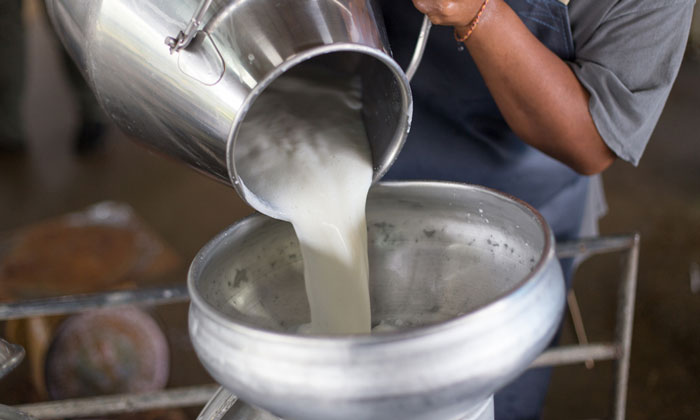Some farm equipment is a source of toxic chemicals in dairy, study finds
- Like
- Digg
- Del
- Tumblr
- VKontakte
- Buffer
- Love This
- Odnoklassniki
- Meneame
- Blogger
- Amazon
- Yahoo Mail
- Gmail
- AOL
- Newsvine
- HackerNews
- Evernote
- MySpace
- Mail.ru
- Viadeo
- Line
- Comments
- Yummly
- SMS
- Viber
- Telegram
- Subscribe
- Skype
- Facebook Messenger
- Kakao
- LiveJournal
- Yammer
- Edgar
- Fintel
- Mix
- Instapaper
- Copy Link
Posted: 2 May 2018 | George Smith (New Food) | No comments yet
The dairy industry in the U.S. has been urged to finish the phase-out of phthalates in plastic and rubber as the FDA is accused of being ‘asleep at the switch’.


CLEAN RECORD?: Phthalates are a widely used class of hormone-disrupting chemicals
A new report by the Coalition for Safer Food Processing & Packaging has both bad news and good news for lovers of dairy products.
The report confirms that some plastic and rubber equipment used to milk cows still contains hormone-disrupting chemicals known as ortho-phthalates.
Previous studies have shown that phthalates can escape into fatty foods such as dairy during processing, packaging, and preparation. The good news, investigators found, is that dairy equipment suppliers already offer many non-phthalate alternatives.
“Shockingly, this report found that the most toxic phthalate, DEHP, is still used in some food processing, even though it’s banned in Europe and in children’s toys in the U.S.,” said Mike Belliveau, Executive Director of the Environmental Health Strategy Center. “With the U.S. Food & Drug Administration asleep at the switch, manufacturers must phase out all remaining uses of phthalates in order to protect both consumers and dairy farmers.”
“Parents who buy dairy products and other food for their families want greater assurance of safety,” said Tracy Gregoire, Healthy Children Project Coordinator at the Learning Disabilities Association of America. “Industrial chemicals that put children at risk for IQ deficits and learning and behaviour problems don’t belong in our food supply.”
The report, “Sources of Phthalates in Dairy Farm Equipment,” was researched and written by Pure Strategies, a sustainability consulting firm, which reviewed industry documents and interviewed several experts. Pure Strategies researched and wrote the report under contract to the public health nonprofit the Environmental Health Strategy Center.
In addition, the Ecology Center, also a public health nonprofit, screened 20 samples of dairy farm equipment for phthalates. For the samples that screened positive for phthalates, the Ecology Center contracted with a laboratory to identify the specific phthalates. (View photos and detailed results for the dairy farm equipment samples screened by the Ecology Center here.)
Although further study is necessary to determine which specific types and brands of dairy farm equipment still contain phthalates or are non-phthalate, this investigation found:
In general, among the top five dairy equipment suppliers in the United States:
- Two major dairy equipment suppliers are now reportedly 100 per cent non-phthalate: DeLaval based in Sweden, and GEA from Germany.
Flexible tubing, used to transfer milk from dairy cows to holding tanks:
- At least one manufacturer of flexible PVC tubing, Finger Lakes Extrusion Corporation based in New York, still uses phthalates. Finger Lakes distributes its products nationwide;
- The Finger Lakes dairy tubing (Glitex brand) contains DEHP, the most toxic phthalate still in widespread use, at a concentration of 30 per cent to 40 per cent by weight;
- Finger Lakes informed Pure Strategies that a non-phthalate alternative is under development;
- In a subsequent conversation with the Environmental Health Strategy Center, the company would not commit to a release date for its non-phthalate alternative or to phasing out phthalates in all dairy tubing;
- None of the ten samples of flexible dairy tubing from other manufacturers tested positive for phthalates, including those made of silicone, rubber, PVC plastic, or other plastic; and
- All six samples of PVC tubing tested contained an alternative to phthalates, either DOTP or glycerin triacetate (triacetin).
Teat cup liners (also known as inflations), which attach to the cow’s udder and draw the milk through a pumping action:
- Of the two rubber inflations tested, only one, the NuPulse brand, contained phthalates. The tested NuPulse rubber inflation contained two phthalates, DIDP and DINP, at a concentration of more than 10 per cent; and
- Silicone inflations appear to be an alternative free of both phthalates and chemicals called adipates, whose hazards are not yet well known. Silicone’s reported durability may outweigh a somewhat upfront higher cost.
Gaskets and O-rings, used to seal joints in mechanical milking equipment:
- There was no evidence of phthalates contained in the four samples tested; and
- One gasket made of PVC contained DOTP, an alternative to phthalates.
Other dairy farm equipment tested for phthalates included:
- Two plastic dip cup bottles did not test positive for phthalates;
- There was no evidence of phthalates in one plastic milk filter that was tested; and
- One sample of silage wrap was also non-phthalate.
The report recommends additional investigation to determine which other suppliers of dairy farm equipment still use phthalates and which are now non-phthalate.
Phthalates are a widely used class of hormone-disrupting chemicals added to plastics, rubber, adhesives, printer inks, sealants, coatings, and fragrance. Human exposure to phthalates has been linked to lower sperm quality and infertility, and to lower IQ and learning problems in children.
In 2017, federal scientists concluded that up to 725,000 American women of childbearing age are exposed daily to five phthalates at levels that may harm the health of a developing fetus.
Most people are exposed to phthalates mainly from the food they eat. Phthalates have been shown to enter the food supply from every point along the supply chain – at the farm, during processing, from packaging, and during food preparation.
Last year, these toxic chemicals were found in 29 of 30 cheese products tested at a qualified independent lab. Previous research in Belgium shows that phthalates enter dairy products at the dairy farm, during dairy processing, and from packaging of dairy products. A new research study recently linked dining out to higher phthalate exposure, especially for foods such as cheeseburgers eaten away from home.
In 2011, Europe banned most phthalates in food contact materials made of plastic or rubber for use with fatty foods (including dairy products) and infant foods. However, the U.S. Food and Drug Administration still allows the use of 28 phthalates in food contact materials, based on outdated science and regulatory decisions made 30 to 60 years ago.







